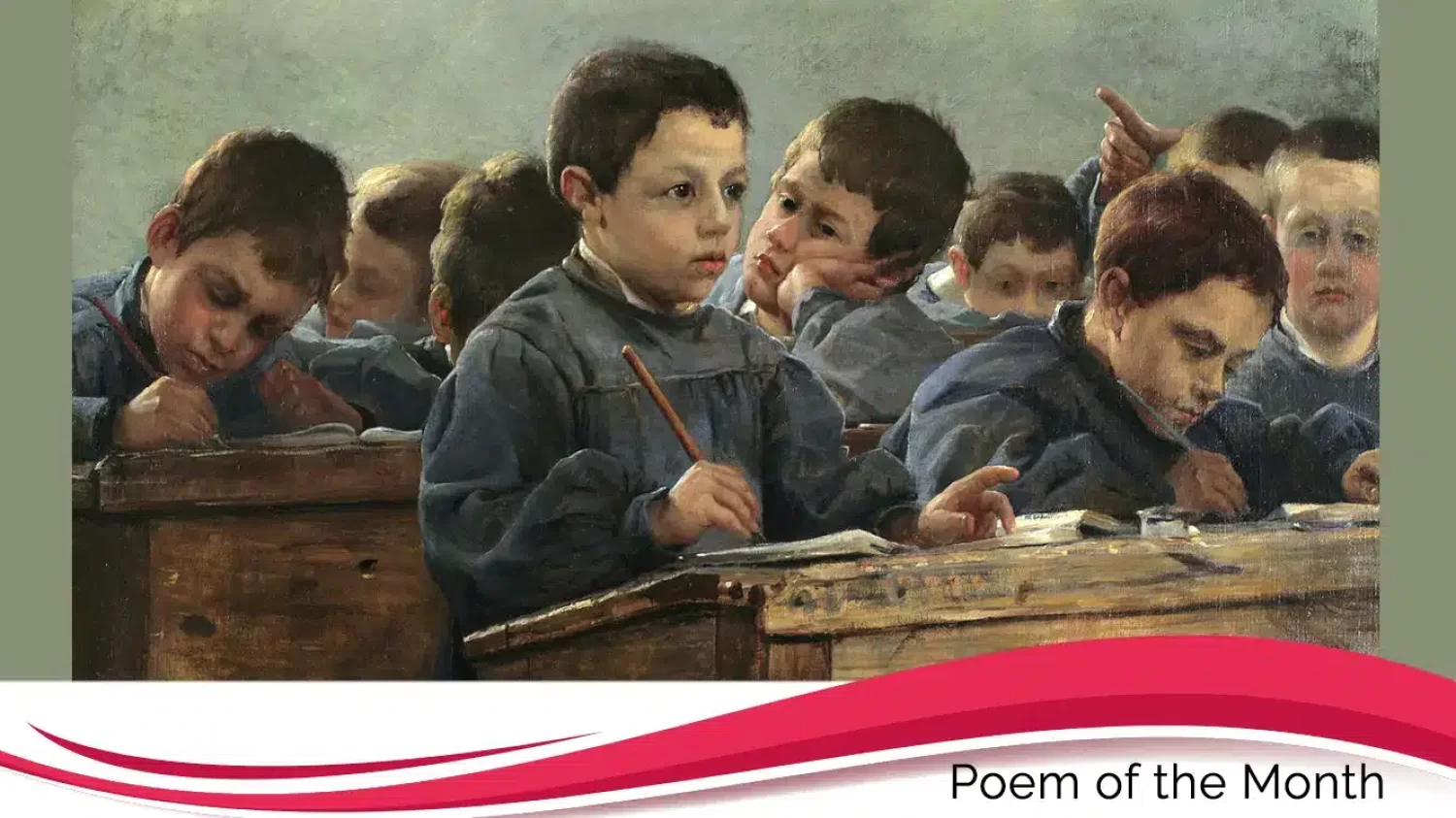D.H. Lawrence (1885 – 1930) was a reluctant schoolteacher. He avoided going into the coal mines like his father and one of his brothers, but there seemed few options available for an intelligent young man, and he trained as a pupil teacher from 1902 to 1906. He received his teaching certificate in 1908 and went off to teach in Croydon, London. He was already writing stories and poems and would have much preferred to concentrate on literature rather than on unruly pupils. His novel The Rainbow (1915) also shows his dislike of the classroom.
Afternoon in School – The Last Lesson by D.H. Lawrence
When will the bell ring, and end this weariness?
How long have they tugged the leash, and strained apart
My pack of unruly hounds: I cannot start
Them again on a quarry of knowledge they hate to hunt,
I can haul them and urge them no more.
No more can I endure to bear the brunt
Of the books that lie out on the desks: a full three score
Of several insults of blotted pages and scrawl
Of slovenly work that they have offered me.
I am sick, and tired more than any thrall
Upon the woodstacks working weariedly.
And shall I take
The last dear fuel and heap it on my soul
Till I rouse my will like a fire to consume
Their dross of indifference, and burn the scroll
Of their insults in punishment? – I will not!
I will not waste myself to embers for them,
Not all for them shall the fires of my life be hot,
For myself a heap of ashes of weariness, till sleep
Shall have raked the embers clear: I will keep
Some of my strength for myself, for if I should sell
It all for them, I should hate them –
– I will sit and wait for the bell.
The poem shows a teacher’s exhaustion and despair as he tries to instil in the heads of sixty students some rudiments of knowledge. He is weary of them ignoring his instructions, handing in lazy work, and showing no curiosity for learning.
The poem surprises the reader. The title leads one to expect it is a student who is longing for the last bell of the day, but instead it is the teacher. And the teacher reaches the conclusion that he is simply not going to try any more, but will conserve his energy and wait for the last bell to bring his misery to a close. He admits that he cannot push his students any further and even compares them to wild animals. It’s a sad picture of an overcrowded classroom, a teacher who is in the wrong profession, and unmotivated pupils who might never know the desire to learn.
Listen to a reading of this poem:
Afternoon in School – The Last Lesson
Have you enjoyed this poem? I’d love to know what you think, let me know by leaving a comment.
Selected links for relevant websites, books, movies, videos, and more. Some of these links lead to protected content on this website, learn more about that here.

Helen Gentle
As a retired teacher, I enjoyed reading DH’s poem, Susannah, and trying to make sense of his metaphors, but the recorded reading was dreadful…
Melody Lord
The first stanza reads very much as a parody of Wyatt’s ‘Whoso list to hunt’ — a sonnet about his doomed love of Anne Boleyn — using some of the same literary tropes and forms to express weariness and pointlessness. DHL is very clever.
Graham H.
Well – I’m all in favour of D. H. Lawrence. And of poetry. And of D. H. Lawrence poetry. But still – I’m struggling with the metaphors here. Firstly, it is in the very nature of hounds, to be motivated and to eponymously hound their quarry. So the uncooperative students should not be compared to “unruly” hounds; they should not be compared to hounds, at all. (Plus – you have to wonder – if they’re “tugging” and “straining”, then why do they need “urging”?). Secondly, if knowledge is something hounded, well, it should – so call me literal – be fox-like. And if the hounds are so non-houndy that they haven’t really caught any knowledge-like quarry at all, then the pile of poor turned-in assignments should not even be “mangy”-fox-like, let alone morph inexplicably into a whole new side-track metaphor like combustible wood stacks. I have read, better poems. “Shall I compare thee to a summer’s day?”, it ain’t.
Susannah Fullerton
Perhaps not DHL’s best poem, but I had never come across it before and was rather taken by it. Perhaps the hounds are after the teacher’s sanity, not knowledge?